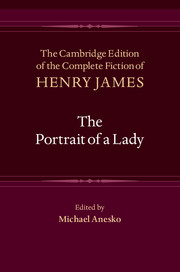Book contents
- Frontmatter
- Contents
- List of Illustrations
- Acknowledgments
- List of Abbreviations
- General Editors’ Preface
- General Chronology of James’s Life and Writings
- Introduction
- Textual Introduction
- Chronology of Composition and Production
- Bibliography
- The Portrait of a Lady
- Glossary of Foreign Words and Phrases
- Notes
- Textual Variants
- Emendations
- Appendices
Chapter 35
Published online by Cambridge University Press: 11 April 2021
- Frontmatter
- Contents
- List of Illustrations
- Acknowledgments
- List of Abbreviations
- General Editors’ Preface
- General Chronology of James’s Life and Writings
- Introduction
- Textual Introduction
- Chronology of Composition and Production
- Bibliography
- The Portrait of a Lady
- Glossary of Foreign Words and Phrases
- Notes
- Textual Variants
- Emendations
- Appendices
Summary
ISABEL, when she strolled in the Cascine with her lover, felt no impulse to tell him that he was not thought well of at the Palazzo Crescentini. The discreet opposition offered to her marriage by her aunt and her cousin made on the whole little impression upon her; the moral of it was simply that they disliked Gilbert Osmond. This dislike was not alarming to Isabel; she scarcely even regretted it; for it served mainly to throw into higher relief the fact, in every way so honourable, that she married to please herself. One did other things to please other people; one did this for a more personal satisfaction; and Isabel's satisfaction was confirmed by her lover's admirable good conduct. Gilbert Osmond was in love, and he had never deserved less than during these still, bright days, each of them numbered, which preceded the fulfilment of his hopes, the harsh criticism passed upon him by Ralph Touchett. The chief impression produced upon Isabel's mind by this criticism was that the passion of love separated its victim terribly from every one but the loved object. She felt herself disjoined from every one she had ever known before—from her two sisters, who wrote to express a dutiful hope that she would be happy, and a surprise, somewhat more vague, at her not having chosen a consort who was the hero of a richer accumulation of anecdote; from Henrietta, who, she was sure, would come out, too late, on purpose to remonstrate; from Lord Warburton, who would certainly console himself, and from Caspar Goodwood, who perhaps would not; from her aunt, who had cold, shallow ideas about marriage, for which she was not sorry to manifest her contempt; and from Ralph, whose talk about having great views for her was surely but a whimsical cover for a personal disappointment. Ralph apparently wished her not to marry at all—that was what it really meant— because he was amused with the spectacle of her adventures as a single woman. His disappointment made him say angry things about the man she had preferred even to him: Isabel flattered herself that she believed Ralph had been angry.
- Type
- Chapter
- Information
- The Portrait of a Lady , pp. 338 - 344Publisher: Cambridge University PressPrint publication year: 2016

